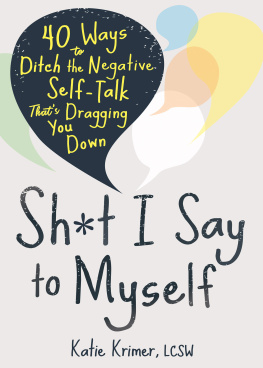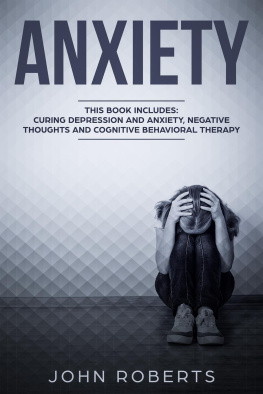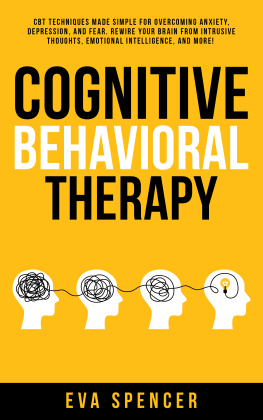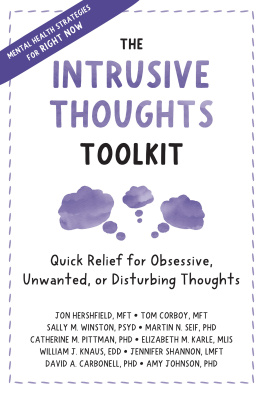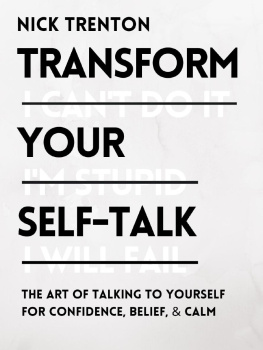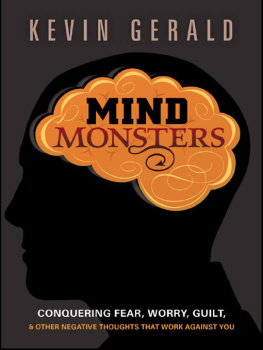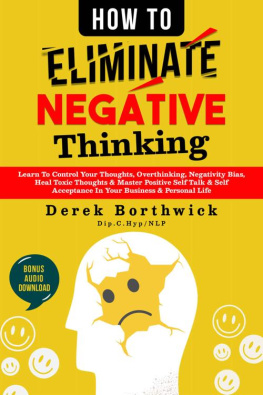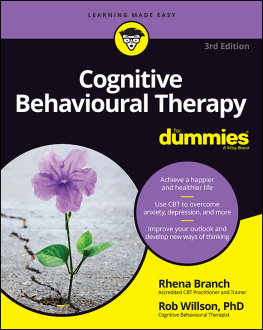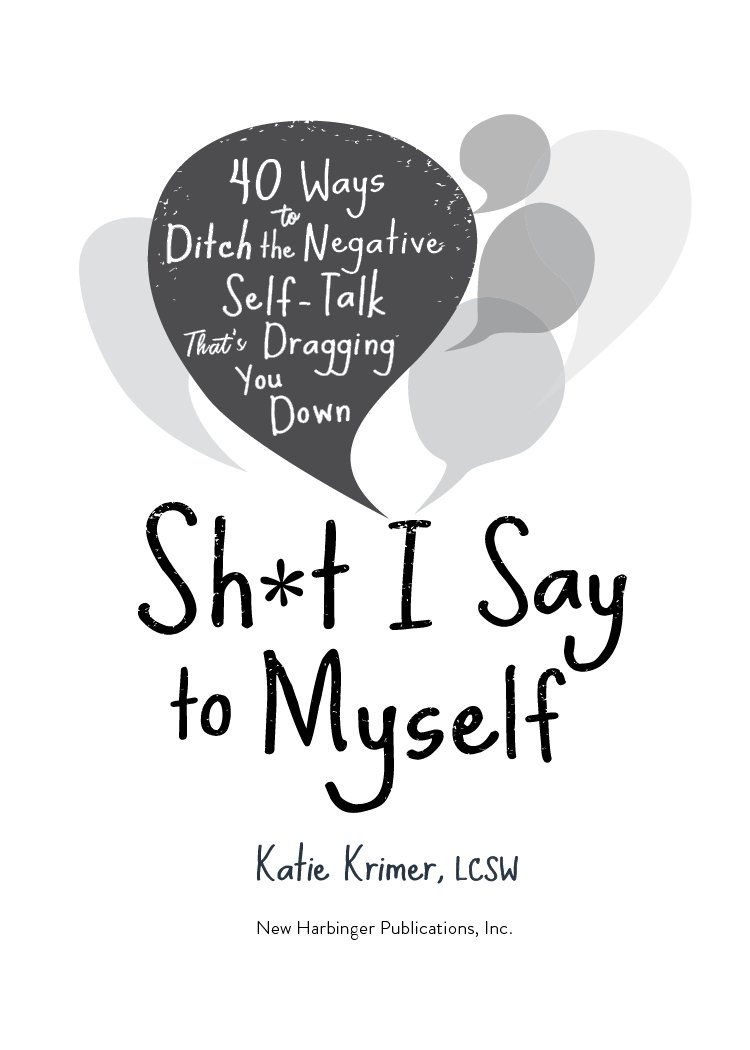Sh*t just got real! Katie Krimer expertly cuts through the BS with authentically practical strategies to tame the inner assh*le living in all of our heads.
Jodie Eckleberry-Hunt, PhD, ABPP, author of Move on Motherf*cker and Getting to Good Riddance
One occupational hazard of being a psychotherapist is to rely too heavily on the question of Why? Katie Krimer points out how our thoughts, among the most ephemeral of all phenomena, have a disproportionate gravitational pull on our experience of ourselves in the world. She offers alternative and practical suggestions to chip away at these persistent, limiting, and destructive thoughts, mercifully delivered in an easy-to-swallow manner. (I just wish I knew what sh*t meant).
Paul R. Fulton, EdD, director of the certificate program in mindfulness and psychotherapy at the Institute for Meditation and Psychotherapy, part-time faculty in the department of psychiatry at Harvard University, and coeditor of Mindfulness and Psychotherapy
Negative self-talk can be a really f*ing hard habit to break. Luckily for all of us, Katie Krimers book, Sh*t I Say to Myself, does an amazing job of laying out super-common, unhelpful thoughts and walking us through the best ways to respond and reframe them. I want her to be my therapist! Instead, Ill settle for the next best thing: this sharp, funny, sassy, practical book.
Kelsey Torgerson Dunn, MSW, LCSW, adolescent anxiety specialist, founder of Compassionate Counseling St. Louis, and author of When Anxiety Makes You Angry
As a coach to high performers on the stage, screen, NFL, and MLB, I am no stranger to the ways in which we talk to ourselves impacts our well-being and success. This book is a glowing resource for helping all of us deal with that not-so-little voice in our heads. Not only does it lay out clear, proven strategies for adaptive self-talk, it also entertains with compelling stories and funny yet pithy artwork! Whether you are working on a specific goal or simply working to find more happiness and peace in a stressful world, this book is for you!
Jonathan Fader, motivational interviewing trainer part of the Motivational Interviewing Network of Trainers (MINT), coauthor of Coaching Athletes to Be Their Best, and author of Life as Sport
Katie Krimer would be the first to say that she didnt invent many of the ideas in her book, but might have to follow some of her own principles to admit what will be obvious to any reader: She is a wonderful writer with a lucid style and the ability to synthesize numerous concepts to make eradicating negative self-talk an approachable, practical, enjoyable, nuanced, and non-corny enterprise!
Michael Dulchin, MD, assistant clinical professor of psychiatry at New York University Langone Medical Center, and cofounder of both Union Square Practice and Sportstrata
This book uses irreverence, wisdom, and behavioral science to help you break patterns of negative self-talk and take back your life!
Dennis Tirch, PhD, author of The Compassionate-Mind Guide to Overcoming Anxiety, and founder and director of The Center for Compassion Focused Therapy
Publishers Note
This publication is designed to provide accurate and authoritative information in regard to the subject matter covered. It is sold with the understanding that the publisher is not engaged in rendering psychological, financial, legal, or other professional services. If expert assistance or counseling is needed, the services of a competent professional should be sought.
NEW HARBINGER PUBLICATIONS is a registered trademark of New Harbinger Publications, Inc.
New Harbinger Publications is an employee-owned company.
Copyright 2022 by Katie Krimer
New Harbinger Publications, Inc.
5674 Shattuck Avenue
Oakland, CA 94609
www.newharbinger.com
Cover design by Sara Christian; Illustrations by the author: Interior design by Amy Shoup and Michele Waters-Kermes; Acquired by Jess OBrien
All Rights Reserved
Library of Congress Cataloging-in-Publication Data
It isnt the things that happen to us in our lives that cause us to suffer, its how we relate to the things that happen to us that causes us to suffer.
Pema Chdrn
How can we drop negativity, as you suggest? By dropping it. How do you drop a piece of hot coal that you are holding in your hand? How do you drop some heavy and useless baggage that you are carrying? By recognizing that you dont want to suffer the pain or carry the burden anymore and then letting go of it.
Eckhart Tolle
Contents
No More Talking Shit
The part of the therapist gig that really sucks is hearing peoples shitty self-talk. Over the last eight years, Ive seen it come in many forms. There are the overt statements of self-hatred and there are the covert, backhanded ways of knocking ourselves down.
There are far more pleasant and effective ways to relate to your life, struggles, and busy mind. Lucky for you, if the shit you say to yourself is holding you back, I have a solution just dont fucking do it . Simple. If you are ready to quit cold turkey, find your receipt and return the book, no hard feelings. Otherwise, I suggest you make yourself comfortablechanging habits of the mind is fucking hard .
You might be pleased to know, however, that you will be learning from a true experta recovered negative thinker and self-talker. Im also a former insomniac, lifelong worrier and overthinker, recurring panic attack survivor, skilled ruminator, and recuperating perfectionist. (The rest of the list will be covered in the sequel, Shit Your Therapist Went Through ).
At twenty-three, within just one week, I moved in with and then broke up with the person I thought I would marry. I didnt cope welltoo fucking prideful to ask for help. This was all while pursuing my graduate degree in clinical psychology and battling some gnarly mental health diagnoses. The disillusion had hit hardthe rom-com stories I had placed on pedestals dissolved before me.
A friend handed me my first book about mindfulness called When Things Fall Apart: Heart Advice for Hard times by Pema Chdrn. It changed my life, namely by making me confront how damaging my inner voice had become and introducing ways to dismantle my inner fearmonger and hater.
I began making conscious changes to the language I used to talk to myself, and I dove into mindfulness practice to be more present and less judgmental ofeverything. With every moment of self-compassion when life got difficult, my self-talk evolved into a much kinder version. I learned how to catch myself in negative narratives and to have more healthy conversations with myself.
Throughout these pages, we will discover different approaches to treating our minds as we would a loving friend, instead of a warring enemy. Together, well explore creative ways to transform self-judgment and negative thinking into self-kindness, mindful awareness, equanimity, and positivity.
As you journey through this book, consider keeping a journal or notebook (or make notes on your phone!) to complete the exercises. Take your time and respond to questions fully, reflect honestly on your experience.
So, before this book gets a home on a dusty shelf filled with unread pop-psych books, grab your notebook and kindly answer the following questions:
Has talking shit to or about yourself been effective?
Has devaluing yourself resulted in the positive, long-lasting changes youve always longed for?
Has your self-shaming skyrocketed your motivation and confidence?

